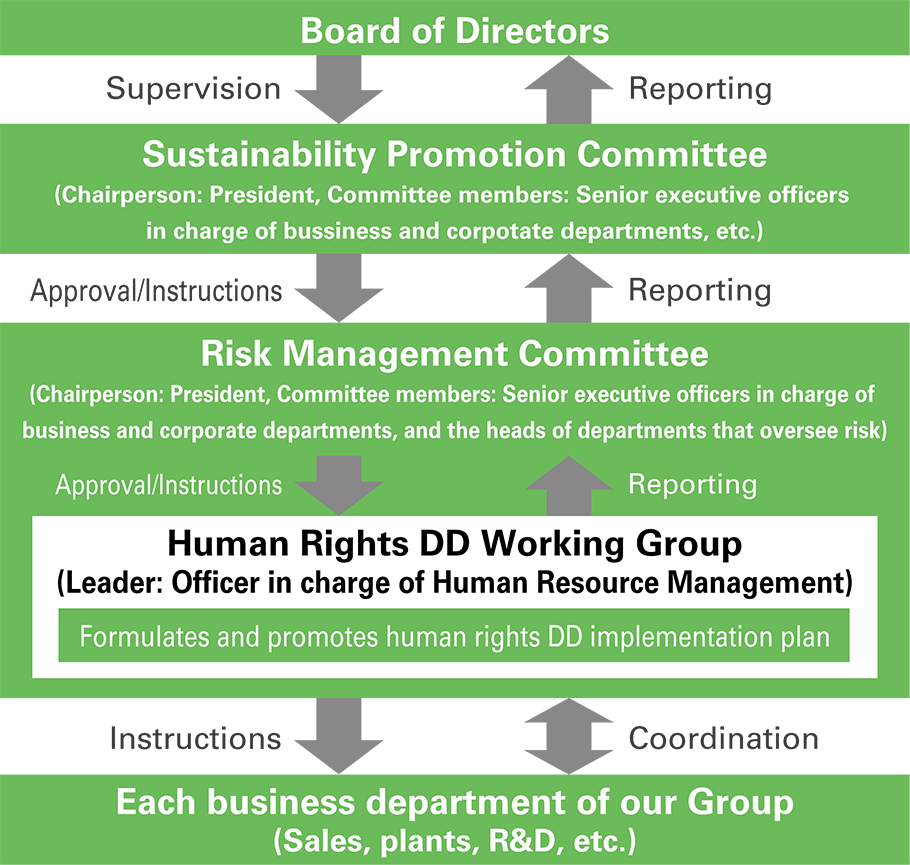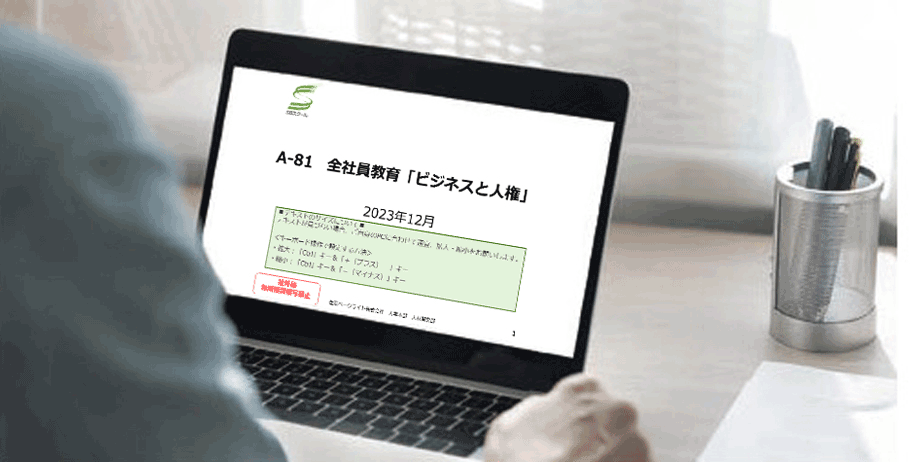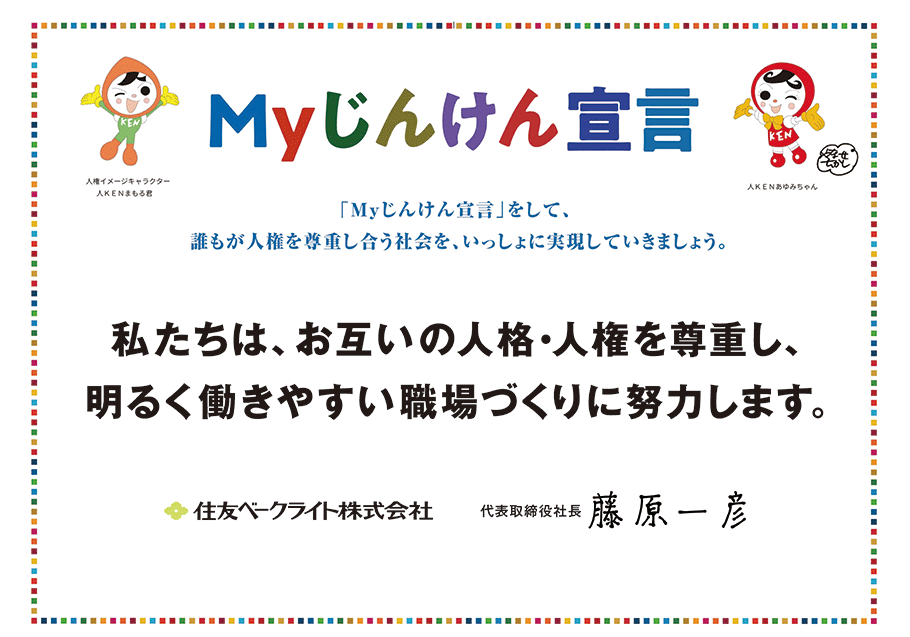Basic Approach and Policy Related to Human Rights
Our Company established “Human Rights Policy for the Group of Sumitomo Bakelite Co., Ltd.” on February 1, 2024 to serve as a guideline for our Group’s efforts to respect human rights in our Group’s business activities. This policy has established in accordance with international standards on human rights such as the United Nations’ “Guiding Principles on Business and Human Rights” and the Japanese Government’s “Guidelines on Respecting Human Rights in Responsible Supply Chains.” And this policy was approved by our Company’s Board of Directors after passing through our Company’s Sustainability Promotion Committee.
Human Rights Policy for the Group of Sumitomo Bakelite Co., Ltd. (Established on February 1, 2024)
1. Purpose
Sumitomo Bakelite Co., Ltd. has established this “Human Rights the Policy for the Group of Sumitomo Bakelite Co., Ltd.” (hereinafter “Policy”), to guide Sumitomo Bakelite Co., Ltd. and its subsidiaries (hereinafter “Our Group”) efforts to respect human rights in Our Group’s business activities, together with the “Business Philosophy,” "Our Code of Conduct,” “Code of Ethics for Group of Sumitomo Bakelite Co., Ltd.” etc.
2. Basic Principles on Human Rights/Supporting and Respecting International Standards on Human Rights
Our Group will support and respect the internationally recognized human rights which are defined in the “International Bill of Human Rights (“Universal Declaration of Human Rights,” “International Covenant on Civil and Political Rights,” and “International Covenant on Economic, Social and Cultural Rights”),” ILO’s “Declaration on Fundamental Principles and Rights at Work,” etc. Our Group will support and respect the UN “Guiding Principles on Business and Human Rights,” the “OECD “Guidelines for Multinational Enterprises” and other international standards on human rights, and will conduct our Group’s business activities in accordance with these international standards on human rights.
Our Group will comply with the laws and regulations of each country/region where Our Group conducts its business activities. If there are any conflicts between the laws and regulations of each country/region and these international standards on human rights, we will seek ways to respect these international standards on human rights as much as possible.
3. Basic Principles on Human Rights / Respect for Human Rights through Business Activities
Our Group will fulfill its responsibility to respect human rights, by not violating the human rights of those who are affected by Our Group’s business activities, and by taking appropriate measures for corrective action if it becomes clear that Our Group’s business activities have caused or contributed to adverse impacts on the human rights.
Our Group recognizes that its commitment to human rights issues related to the Group’s its business activities, including the following, is an important element in fulfilling its responsibility to respect human rights.
(1) Prohibition of child labor
Our Group will not tolerate any child labor (especially “the worst forms of child labor,” such as forced or compulsory recruitment into armed conflict and work by its nature that is likely to harm the health, safety or morals of children).
(2) Prohibition of forced labor
Our Group will not tolerate modern slavery in the forms of forced labor, debt bondage (work in situations where a person is forced to work for an employer to repay a debt) and human trafficking.
(3) Prohibition of discrimination
Our Group will not tolerate discrimination in any way based on sex, age, nationality, ethnicity, race, religion, ideology or creed, sexual orientation or gender identity, or disability, etc. in employment and work situations.
(4) Prohibition of harassment and violence
Our Group will not tolerate harassment or behavior that harms others, whether mentally or physically.
(5) Respect for fundamental labor rights
In addition to complying with laws and regulations related to fundamental labor rights (freedom of association, workers’ right to collective bargaining, etc.), Our Group will support and respect these rights.
(6) Reduction of excessive working hours
In addition to complying with laws and regulations and managing working hours, overtime, holidays, and vacations appropriately, our Group will endeavor to reduce excessive working hours.
(7) Payment of appropriate wages and allowances
Our Group will pay wages and appropriate allowances that exceed the legally mandated minimum wage and meet the living wage (the wage necessary for basic, but decent life style).
(8)Ensuring a safe and healthy working environment
Our Group will actively endeavor to ensure a safe and healthy working environment based on Our Group’s Safety Philosophy, “Safety is the first priority of all.”
4. Scope of Application
This Policy applies to all directors, officers and employees of Our Group. In addition, Our Group expects all business partners who are involved in Our Group’s business activities, products, and services, to understand and support this Policy.
5. Human Rights Due Diligence
Our Group will establish an appropriate human rights due diligence system and mechanism in accordance with the United Nations “Guiding Principles on Business and Human Rights,” and Our Group will identify the adverse impacts on human rights of those who are affected by Our Group’s business activities and will endeavor to prevent and reduce such adverse impacts.
6. Training
In order to ensure that this Policy is incorporated into all Our Group’s business activities and implemented effectively, Our Group will provide appropriate training to our directors, officers, and employees, and will endeavor to ensure that all business partners and other persons who are affected by Our Group’s business activities understand this Policy.
7. Dialogue and Consultation with Stakeholders
In Our Group’s efforts to respect human rights, Our Group will engage in dialogue and consultation with stakeholders, including human rights experts, labor unions, business partners etc., and will promote comprehensive measures based on specialized knowledge and a wide range of ideas.
8. Grievance Mechanism
Our Group will maintain the existing whistleblowing and consultation contacts to ensure access to remedies from within and outside Our Group, and will work to develop and operate a more effective grievance mechanism.
9. Information Disclosure
Our Group will regularly disclose information on the progress and results of our efforts to respect human rights based on this Policy through Our Group’s website and other means.
This Policy was resolved by the board of directors meeting of Sumitomo Bakelite Co., Ltd. held on January 31, 2024.
End
Human Rights Due Diligence (DD) Promotion System, Implementation of Human Rights DD
From fiscal 2024, we embarked on Human Rights Due Diligence in accordance with international standards on human rights such as the United Nations’ “Guiding Principles on Business and Human Rights” and the Japanese Government’s “Guidelines on Respecting Human Rights in Responsible Supply Chains.”
We have established a cross-organizational “Human Rights DD Working Group” (leader: Officer in charge of Human Resources Management) within the Risk Management Committee (chairperson: President, members: Senior executive officers in charge of business and corporate departments, and the heads of departments that oversee risk), to develop and promote a human rights DD implementation plan under the supervision of the Risk Management Committee.
In fiscal 2024, our Group has been identifying and assessing the negative impacts of our business activities on human rights.
From fiscal 2025 onwards, we plan to prioritize and address the human rights issues identified in this assessment.

Internal Training on Human Rights
We provide e-learning training on human rights for all employees of our company and affiliated companies in Japan, as well as some employees of overseas affiliated companies, to coincide with Human Rights Week in every December.
There were two main themes of training in fiscal 2023: "Business and Human Rights” and "Harassment Prevention Training.”
“Business and Human Rights” is training focusing on global trends surrounding “Business and Human Rights,” the need for companies to address human rights, and the status of our Company’s efforts.
“Harassment Prevention Training” encourages our employees to correctly understand various types of harassment, including “power harassment,” “sexual harassment,” and "harassment related to pregnancy, childbirth, and childcare leave,” and to take steps to prevent such harassment. We also mentioned what actions should be taken in the event of harassment, and disseminated the process for resolution and relief.

- Employees receive computer-based internal training
Measures to Ensure Respect for Human Rights Throughout the Supply Chain
We strive to ensure compliance with the laws, regulations, and social norms of Japan and the other countries and regions. In addition, we request our business partners to do the same, in response to changes in social expectations for companies and based on the idea that not only we but also our business partners are necessary to strive to fulfill corporate social responsibilities.
Specifically, as a general rule, we request our business partners from which we purchase raw materials etc. to conclude basic purchase agreements, in which both parties agree to comply with provisions that include respect for human rights.
In addition, we established the following as our procurement policy and conduct procurement activities that take human rights into consideration.
Sustainable Procurement Policy (excerpt)
Sustainable Procurement
We will conduct our procurement activities in compliance with local laws and regulations as well as international standards with respect to human rights, labor, health and safety, ethics, and the environment. At the same time, we request that our business partners take similar measures.
Major Sustainable Procurement Items
(1) Human rights, labor, health and safety
- Prohibition of inhumane treatment such as child labor, forced labor, discrimination, and harassment
- Payment of appropriate wages (above minimum wage and meeting a living wage) and allowances
- Appropriate working hours management and securing holidays
- Respect for freedom of association and the right to collective bargaining, etc.
- Implementing responsible minerals sourcing (understanding the country of origin and distribution process, promoting sourcing from certified smelters and processors)
- Ensuring occupational health and safety
(2) Ethics, Information Security
- Promotion of fair and free competition (compliance with antitrust laws, etc.)
- Anti-corruption (anti-bribery, compliance with money laundering and terrorist financing regulations, elimination of relationships with anti-social forces, etc.)
- Personal information protection, prevention of leakage of confidential information
(3) Environment
- Preservation of the global environment
- Initiatives to reduce environmental impact and address climate change
- Reduction of energy consumption and greenhouse gas emissions
- Pollution prevention (air, water, soil)
- Use of sustainable water resources
- Waste reduction and efficient use of resources (reduce, reuse, recycle)
- Biodiversity conservation initiatives
We conduct sustainable procurement survey of major suppliers, which includes requirements for human rights, labor, health and safety, etc., to confirm the status of human rights initiatives in the supply chain.
As part of our ongoing efforts regarding responsible minerals sourcing, we established the “Responsible Mineral Sourcing Policy for the Group of Sumitomo Bakelite Co., Ltd.” and conduct surveys of the suppliers that handle raw materials and parts in which tin, tantalum, tungsten, gold, cobalt, and/or mica is used or added, by using the Conflict Minerals Reporting Template (CMRT)/Extended Minerals Reporting Template (EMRT) published by RMI.
Please see the link below for the details on our Procurement Policy, sustainable procurement survey, and responsible mineral sourcing.
Grievance Mechanism
As a means of relief in cases where our Group is causing or contributing to negative impacts on human rights, our Group have established a reporting and consultation contacts (Compliance Whistleblower System) that can be used by all stakeholders of our Group, which includes our Group’s director, officer and employees, as well as retired employees, job applicants, and business partners. Additionally, dedicated “Harassment Contact Points” have been set up at Sumitomo Bakelite Co., Ltd. and subsidiaries in Japan as part of a system that allows employees to discuss their concerns related to various forms of harassment, including power harassment, sexual harassment, and maternity harassment. Some subsidiaries overseas have also developed their own internal reporting systems and complaints handling mechanisms. Our Group will continue to develop grievance mechanisms that are increasingly more effective.
Endorsed the “My Declaration of Human Rights”
The Group has announced its endorsement of the aims of the My Declaration of Human Rights project by the Ministry of Justice and the National Federation of Consultative Assemblies of Civil Liberties Commissioners. The My Declaration of Human Rights is an initiative to realize a society in which everyone respects human rights and companies, organizations, and individuals declare that they will take actions to respect human rights.


